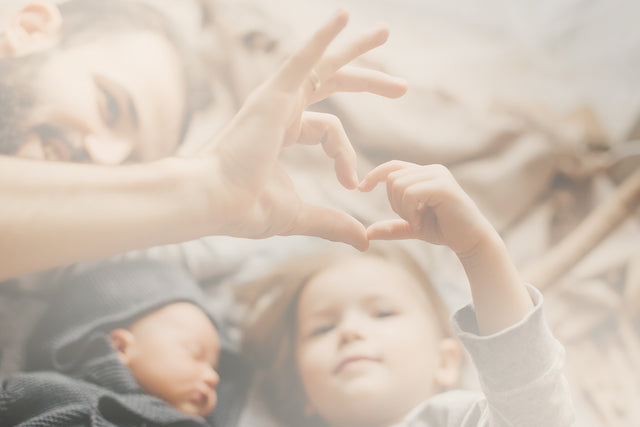What to say when your toddler says "no" to a potty break
Every objection from our little ones is a window into their world, an opportunity to delve deeper into their needs and feelings.
By reframing what could be interpreted as refusal, our toddler's objections become signposts that guide us to collaborate more closely with our little ones, strengthening our parent-child bond we share as we navigate the path to potty independence.
In this article, we explore 10 common ways our toddlers might object to using the potty and offer respectful responses so that they not only feel heard, but know they are important contributors during this time of increased independence.
With each objection, we uncover a chance to foster understanding, empower our children, and create a nurturing environment where they feel heard, supported, and respected. This gentle approach, rooted in positive language and understanding, will help you guide your little one toward potty independence while maintaining a supportive and respectful atmosphere, and highlights natural consequences when appropriate.
As part of the movement of respectful parenting, we know that objections are stepping stones, and collaboration is the cornerstone of success. Knowing you have heard these objections a few too many times lately I'm giving you a huge high five for facing them with me once again here!
10 Common potty objections our toddlers will share with us
1. "No!" (while clearly showing signs of needing to go)
Explore the underlying need: Does your child wants to know that they won't miss out on any playtime by taking a break to use the potty?
Respectful response: "I understand you're having so much fun playing. I can see your body needs to use the potty. Can you tell? Go take care of your body. Then you can get back to playing without stopping because you need to go pee."
2. "I don't want to!" (while playing)
Does your child want reassurance that they won't have to leave their toys behind?
Respectful response: "I see you're really enjoying your toys. How about we bring a special toy with us to the potty? This way, you won't miss out on any fun while you take a short break."
3. "I don't need to go!"
Explore the underlying need: Your child might be asserting their autonomy or is unsure about the sensation of needing to go.
Respectful response: "That's perfectly fine. Sometimes our bodies surprise us. Let's just give it a try, and if you don't need to go, that's okay too! It's always better to check and make sure."
4. "I'm don't like the noise!"
Explore the underlying need: Is your child is expressing fear of a loud and unfamiliar noise?
Respectful response: "I understand the flushing noise can be a bit loud. How about we cover our ears or flush together? This way, we can make it less scary and more comfortable."
5. "I want a diaper!"
Explore the underlying need: Your child might be finding comfort in the familiar and feel unsure about change.
Respectful response: "You used a diaper for a long time right? Now your body is ready to use a potty. I know you can do it! And I'll help you practice. Do you want to hear a story about mommy learning to use the potty?"
6. "I don't like that potty!"
Explore the underlying need: Your child might find the potty unfamiliar or uncomfortable.
Respectful response: "It's okay if you're still getting used to this potty. How about you sit on it and show me what you like and don't like about it.". Hear them. Take notes in a notebook. Tell them you'll see if you can make improvements.
7. "I want you to come with me every time!"
Explore the underlying need: Is your child seeking your comfort and connection? Perhaps more one-on-one time?
Respectful response: "I'm here to support you. Sometimes you can try going on your own, and if you need me, I'll be right here. I'm not going anywhere. You're doing a fantastic job, and I'm proud of you. When you're all done, come give me a big hug ok? I'll be waiting for it!"
8. "I'm too sleepy to use the potty!" / (Or is acting very tired)
Explore the underlying need: Your child might be expressing a desire to stay comfortable and cozy, or might be feeling low energy or need to rest soon.
Respectful response: "I understand you're feeling tired. Using the potty can actually help you feel more comfortable while you rest. We can make it quick, and then you can go (back) to your cozy bed."
9. "I'm busy with _____!" (with a friend)
Explore the underlying need: Your child time together with others
Respectful response: "Your friends will still be here when you come back. Let's tell your friends you need 2 minutes and then you'll be back ok? We'll be SO quick - I'll help you."
10. "I don't want to wear underwear!"
Explore the underlying need: Your child might be attached to the comfort of diapers and unsure about change, or might not like the sensation of underwear, or the work of pulling down and up undies plus pants.
Respectful response: "I know you're used to your diaper, and that's okay. Wearing underwear is a new and exciting step, and accidents can happen. If they do, we'll clean up together and keep practicing." or "Undies help to protect your body and keep your clothes clean. Do you want to wear the green ones or the white ones? Let me know which ones are right for today."
A recap of how we can reframe potty objections from our toddlers
The journey to potty independence is filled with these little objections, each presenting an opportunity for connection, understanding, and growth. By responding with empathy, positivity, and respect, you're not only helping your child overcome their objections but also instilling valuable life skills and fostering a strong parent-child bond.
Potty challenges are a normal part of the process, and with your patient and gentle approach, your child will navigate them with confidence and ultimately embrace their newfound potty independence.

Article Tags: potty training objections, respectful responses, handling objections, potty training challenges, gentle parenting, positive language, potty independence, natural consequences, toddler toilet training, gentle approach, potty training support.

